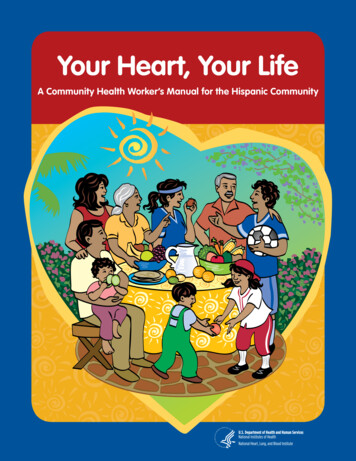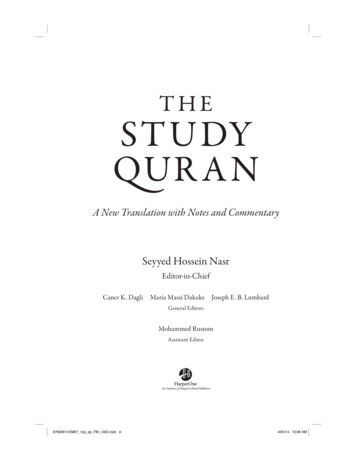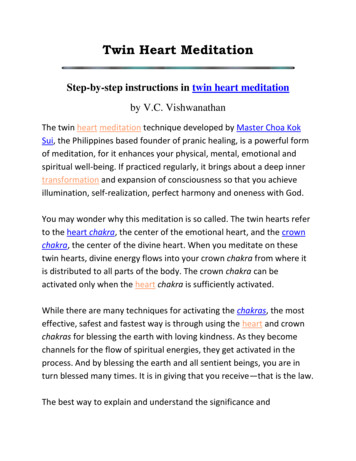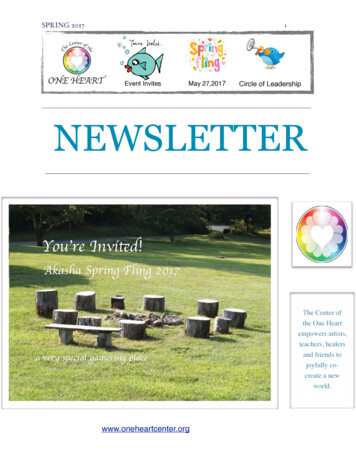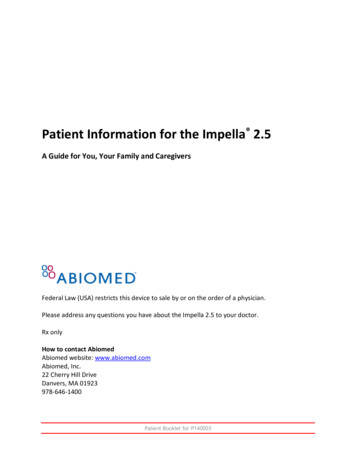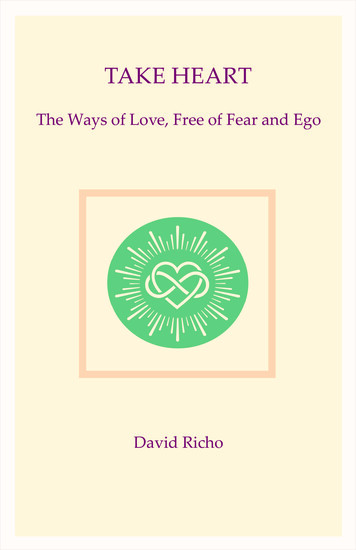
Transcription
TAKE HEARTThe Ways of Love, Free of Fear and EgoDavid Richo
TAKE HEARTThe human heart has no circumference.Nothing can hold it back from loving not onlynear and dear but far and wide. Such love coming from us and to us gives us a sense of fulfillment on our human journey. In this booklet wefind affirmations and practices that help thishappen. We can go beyond fear and ego tocomfort and joy:.Ÿ Using. affirmations to free ourselves fromŸŸŸŸthe grip of fearSeeingthe difference between healthy.anger and abuseLe. ing go of ego-centerednessFindingways to respond to hate or hurt.Showingintegrity and loving-kindness.David Richo is a psychotherapist and author.His website is davericho.com.This book can be ordered online athudevbooks.com/takeheart/.Typese ing and cover design by Dennis Rivers.
TAKE HEARTT he Ways of Love, Free of Fear and EgoDavid Richo
Copyright 2020 by David RichoPermission granted to reprint anddistribute as a free document.
C ON T EN T SIntroduction111. The Wonderful Qualities that Make Us Human122. Affirmations in Stressful Situations . 143. Affirmations to Free Ourselves from the Grip of Fear . 154. The Difference between Anger and Abuse . 135. Letting Go of Ego-Centeredness . 166. When People Hate Us or Hurt Our Feelings . 197. Ways to Show Integrity and Loving-Kindness . 22About the Author . 32
I say Yes to everything that happens to me todayas an opportunityto give or receive love and to free myself from fear.I am thankful for the enduring capacity to lovethat has come to me fromthe Sacred Heart of the universe.May everything that happens to me todayopen my heart more and more.May all that I think, say, feel, do,and am express loving-kindnesstoward myself, those close to me, and all beings.May love be my life purpose, my bliss,my destiny, my calling,the richest grace I can receive or give.And may I always be especially compassionatetoward people who are considered least or lastor who feel alone or lost.From: The Power Of Grace:Recognizing Unexpected Gifts on the Path(Shambhala, 2014)
IntroductionOur human life is certainly a challenging journey. Thoughwe hope that our lives will be easy, comfortable, and serene,they are often filled with complication, conflict, anddisappointment. To set our lives on a positive course, manyspiritual traditions encourage us to live in upright ways,show loving-kindness toward ourselves and others, and freeourselves from ego and fear. This book offers practices thatcan help us act in all those ways. The practices are notstrategies by which we seek to gain perfection or happiness.Their purpose is to help us live our lives at the heart level.This is how we are able to take heart no matter how chaoticthe world becomes or how disappointing people may be tous.Our thrilling destiny is to display in our lifetime the timelessdesign of love and wholeness that has always been inside us.When that matters to us most our self-esteem and spiritualityflourish. Choices and attitudes that show integrity andloving-kindness help that happen. Ultimately, they are thepaths to contentment with ourselves as we are and can beand with the world as it is and may be.There will never be only love or only peacebut there can be more lovethan before we got hereand more peacebecause we stayed here in peace and with love.1
1 The Wonderful Qualities that Make Us HumanEvery human comes into the world equipped with wonderfulgifts. They form our collective human inheritance, resourcesin all of us, qualities that make us truly human: Our ability to go on loving no matter how we aretreated by others and no matter what happened to usin the past Our ability to say no to abuse and not to engage in itourselves Our outrage at and courageous action in the face ofevil Our willingness to put ourselves second, even to riskour life for others Our capacity to forgive and let go Our grief at the loss of those we love Our refusal, at times, to accept defeat no matter whatthe odds Our acceptance, at times, of defeat when the evidencedemands it Our irrepressible playfulness and sense of humor Our unflappable hope Our longings for love, meaning, freedom, happiness,and growth no matter how many times we fail to findthem Our knack for showing our best when things are attheir worst2
Our skill at finding order in chaos and meaning indisaster Our intuition, which reveals more than we logicallyknow Our commitment to act honestly and unselfishly evenwhen no one is looking Our striving for what lies beyond our grasp, ourinclination to stretch ourselves Our power to say, do, or be what leads to healingourselves and others We have it in us to find an opportunity for growth inall that happens Our trust that evil is never the last word, that love isthe strongest force on earth Our ability to say yes unconditionally to theimplacable givens of life Our kindly understanding of and loving reaching outto those who do not choose to live in accord with thislistThese ineffaceable graces show us why we never give up onourselves or others. They are also the firm basis of our trustin ourselves, in the human community, and in a higherpower.From: The Five Things We Cannot Change and the HappinessWe Find by Embracing Them (Shambhala, 2005)3
2 Affirmations in Stressful Situations As I face things as they are, without self-deception orwishful thinking, my predicament becomes a path tosanity and realism.I am not trying to change what is not in my hands tochange.As I let the chips fall where they may I find ways tomake the best of how they land.My Yes to what is and to how I and others are isunconditional.Now I trust that everything that happens to me issomehow a grace from the Sacred Heart of theuniverse, a light that will not go out, somethingenfolding me and unfolding in me.I trust that I have inner resources to see me throughthis.By the way I handle this predicament, may I learn tohelp others who suffer as I do.May all people find the path to healing and hope.Since everything that happens to us, without exception,offers us an opportunity for grace, reality itself is holy. Soevery time we face reality, rather than deny or oppose it, weare being deeply spiritual.From: The Power of Coincidence (Shambhala, 2007)4
3 Affirmations to Free Ourselvesfrom the Grip of FearEven a little progress is complete freedom from fear.–Bhagavad GitaI trust my appropriate fears to give me signals of real danger.I see that I also have unreal fears and worries.More and more I recognize the difference between real andimagined fears.I feel compassion toward myself for all the years I have beenafraid.I forgive those who hypnotized me into unreal fears.I trust that I have as much fearlessness in me as fear.I trust the strength that opens in me when I have to facesomething.I believe in myself as able to handle what comes my waytoday.I create a pause between a trigger and my response.I have the inner resources to handle any fear or trigger.I find support inside and outside myself.I have an enormous capacity for re-building, restoring, andrecovering from fear.I am more and more sure of my abilities.I am more and more aware of how I hold fear in my body.5
I relax the part of my body that holds my fear.I am freeing my body from the grip of fear.I open my body to joy and serenity.I let go of the stress and tension that come from fear.I let go of my fears of sickness, accident, old age, and death.I let go of my fear of the future.I let go of regretful ties to the past.I let go of any tie I may still have to judgments my parentshad of me.I let go of my fear of the unknown.I cease being afraid of knowing, having, or showing myfeelings.I am less and less scared by what happens, by what hashappened, by what will happen.I let go of my fear of what might happen.I let go of my obsessive thoughts about how the worst willhappen.I let go of fear-based thoughts.I trust myself always to find a solution.I catch myself when I engage in paranoid fantasies and I letthem go.My trust in myself is releasing me from fear and fearsomefantasies.I let go of regretting my mistakes; I find the path to going on.6
I let go of basing my decisions on fear.I let go of finding something to fear in everything.I let go of believing that everything is dangerous and headedfor disaster.I see the humor in my exaggerated reactions to unrealdangers.I find a humorous response to every irrational fear.I smile at my scared ego and shrug off its relationship fears: I let go of my fear of aloneness or of time on myhands.I let go of my fear of abandonment.I let go of my fear of closeness.I let go of my fear of commitment.I let go of my fear of being vulnerable.I let go of my fear of giving or receiving.I let go of my fear of loving or being loved.I let go of believing I have to measure up to whatothers want me to be.I give up having to be perfect.I let go of my performance fears.I let go of my sexual fears.I am confident in my ability to deal with people or situationsthat scare me.I let go of my fear of any person.I let go of my fear of saying No to others.I let go of my fear of saying Yes.7
I cease being intimidated by others’ anger.I give up trying to appease those who intimidate me.Attempts to bully me now fall flat.I let go of being on the defensive.I protect myself while always being committed to nonviolence.I stick to my guns and I hold my fire.I let go of feeling obliged to do things his/her/their way.I let go of the need to meet others’ expectations.I state and protect my personal boundaries.I let go of my fear of what might happen if people dislike me.I let go of my terror about disapproval, ridicule, exclusion, orrejection.I dare to stop auditioning for people’s approval or love.I give up the need to correct people’s impressions of me.I give up my poses, pretenses, and posturings; I dare to bemyself.I dare to show my hand, to show my passions, to show myenthusiasms, to show my real feelings, longings, and needs.I want my every word, feeling, and deed to reveal me as Itruly am.I give up being afraid of what I want.I ask for what I want.8
I love being found out, caught in the act of being myauthentic self.I dare to live the life that truly reflects my deepest needs andwishes.I let go of my fear of spending, saving, sharing money.I let go of the fear that I will lose, lose money, lose face, losefreedom, lose friends, lose family members, lose respect, losestatus, lose my job, lose out.I let go of my fear of having to grieve.I let go of fears about my adequacy as a parent or child,partner or friend.I let go of my fear of the fearsome givens of life:impermanence, change, suffering, unfairness, failed plans,losses, and betrayals.I am flexible enough to accept life as it is.I am forgiving enough to accept how I have lived my life sofar.I trust my present predicament as a path.I let go of control; I let the chips fall where they may.I let go of more than any fate can take away from me.I cease being afraid of my own power.I cease being afraid of the power of others.I let go of my fear of authority.I speak truth to power.I dare to take a stand for the oppressed and the marginalized.9
I join with the most vulnerable in our society.I dare to devote my life to co-creating a world of justice,peace, and love.As I show courage for social justice, I notice I am letting goof fear in all areas of my life.I trust ever-renewing sources of bravery within me.I let go of having any fear stop or drive me.Nothing forces me; nothing holds me back.I am a hero: I live through pain and am transformed by it.I show grace under pressure.I stop running; I stop hiding.I have pluck and wit.I meet danger face to face.I stand up to a fight.I speak up for myself.I speak up for others.I let go of hesitation and self-doubt.I notice primitive dreads in me, for example: If I love something I will lose it or have it taken awayfrom me.If something is good it won't last.What is bad will get worse.I recognize these beliefs as superstitions and let go of thefears that support them.I take risks and yet I act with responsibility and caring.10
I keep finding alternatives behind the apparent dead-end offear.I let go of scanning my life to find a reason to be afraid.More and more my fear is becoming healthy excitement.I let fear go and let joy in.I let fear go and let love in.I am grateful for the love that awaits me everywhere.I know I am deeply loved by many people near and far.I feel lovingly held by a higher power (God, Universe,Buddha, etc.).As I devote myself more and more to a higher power thanmyself I feel it alive through, with, and in me.I believe that I have an important destiny and that I am livingin accord with it.I am more and more aware of others’ fears, more and moresensitive to them, more and more compassionate towardthem.I enlarge my circle of love to include every living being.I keep finding ways to show my love.I am great-hearted and bold-spirited.I let go of ill-will toward those who have hurt me.I do good to those who hate me, bless those who curse me,pray or wish enlightenment to those who have mistreatedme.I can say “Ouch!” and open a dialogue rather than retaliate.11
I dare to give of myself unconditionally and I dare to beunconditionally committed to maintaining my ownboundaries.I honor and evoke my animal powers, my human powers, mydivine powers.I set free my love, till now imprisoned by fear.I set free my joy, till now inhibited by fear.I let true love cast out fear.May I always choose the path of gentle love, the best antidoteto fear.I say yes to all that happens to me today as an opportunity tolove more and fear less.I keep letting go and I keep going on.I feel an enduring fearlessness awakening in me.I keep affirming my freedom from fear.I am thankful for the grace of finding freedom from fear.May all beings find freedom from fear.Based on: When Love Meets Fear: How to BecomeDefense-less and Resource-full (Paulist Press, 1997)12
4 The Difference between Anger and AbuseHEALTHY ANGER(the appropriate feeling)ABUSE(the dark side of anger)Is part of an I-ThourelationshipIs an I-It relationshipExpresses a feeling in anauthentic wayBecomes a tantrum in atheatrical wayTakes responsibility forthe feelingBlames the other personIs about a specificincidentIs about a bruised egoFocuses on the here andnowIs contaminated by pastevents or “You always ”Is brief and lets go with asense of closure(like a flare)Is held on to as lingeringresentment, hate, grudge,or bitterness (like asmoldering fire)May be expressed with ared face, excited gestures,and a raised voiceMay be expressed with ared face, menacinggestures, and ascreaming voice13
HEALTHY ANGER(the appropriate feeling)ABUSE(the dark side of anger)Says “Ouch!” assertivelyand respectfully whileseeking a dialogueIs aggressive andadversarial, is an attackbased on ill-will and withan intent to harmCommunicates, reportsan impactPuts down, bullies, ordumps on the otherInforms the other, createsrapt attention in theother so that we want tohave a dialogueIntimidates, threatens,and attempts tooverpower the other sothe only safety lies inleaving the premisesuntil things cool downIs nonviolent, in control,and always shown withinsafe limits (managestemper)Is violent, out of control,derisive, hostile, andpunitive (loses temper)Asks for changeDemands change or elsethreatens retributionMaintains good will at alltimesMaintains a mean ill-willtoward the other14
ABUSE(the dark side of anger)HEALTHY ANGER(the appropriate feeling)Asks for accountabilityand amends to clearthings up so forgivenesscan happenSeeks revenge, keepsholding somethingagainst the otherShows respect for theother as a peerShows contempt towardthe other as a targetAims at a deeper andmore effective bond:an angry person movestoward the otherWants to vent the rageno matter who gets hurt:an abuser moves againstthe otherCoexists with love,maintains connectionCancels the connectionIs fearlessIs fear-basedIs a form of addressing,processing, and resolvingan issue with spiritualconsciousnessIs a form of avoidingone’s own grief anddistress about an issuewith a refusal to workthings out and thereby togrow spirituallyFrom: How to be an Adult (Paulist Press, 1991)15
5 Letting Go of Ego-CenterednessWe or anyone might sometimes come across with anegotistical manner. This includes being arrogant, belligerent,entitled, controlling—the compulsions of a person driven byego.Here are some challenging practices that can help us let go ofegotism and build a healthy ego, one with self-esteem,humility, and loving-kindness. The practices may seem overthe-top in what they ask of us, a radically spiritual way ofliving. Fortunately, we can all rely on grace from a higherpower than ego to let that transformation happen in us.1Follow the Golden Rule: Act toward others as youwould want them to act toward you.2Keep the needs of others in mind, especially in littleways—an antidote to selfishness.3Find ways to maintain healthy self-esteem withoutshowing off. It’s OK to be a big shot; just don’t actthat way.4Let go of ranking, especially of elitism, seeingyourself as above others.5Acknowledge not knowing something or showingthat you need support or help.6Take feedback as useful information not as criticism,even when it is meant that way.7Apologize when you know you have harmed oroffended anyone. Make amends if necessary.8Let go of attempts to control, dominate, or manipulateothers.16
9Give people leeway and make allowances for theirerrors rather than pointing out, or picking them upon, every little thing they do that irks you.10 Welcome disagreement because it can lead todialogue. This puts the emphasis in a discussion onarriving at common ground or learning a new truthrather than proving yourself right.11 Cooperate rather than compete; collaborate ratherthan have to show that you know best.12 In a group, give up having to take center-stage. Tradein your own ego investment for the good of allconcerned or for the accomplishment of the groupgoal.13 Reconcile yourself to the given that you will notalways get your way.14 Don’t hold a grudge against those who wrong youeven when they won't admit it—and stop telling thestory of how they offended you. Look for ways toreconcile rather than retaliate.15 Remain on high alert for the entry of your reactiveego: the moment when you take what happenedpersonally, become indignant, or interpret an actionby someone as a slight to your dignity.16 When someone’s ego is aroused toward you, do notdig your heels in or go nose to nose. Simply pausewith compassion toward the pain in his/her egoreaction and treat it with loving-kindness, while,nonetheless, not putting up with any abuse.17In intimate bonds, give up vindicating yourself inorder to gratify your ego and instead, let go of yourego to gratify the relationship. Become the protector17
of the partnership rather than the defender of yourown ego.18 Do good to those who hate you, pray for or wishenlightenment for those who have betrayed, failed, ormistreated you.19 See losing face (and all these suggestions) as welcomeopportunities for growth in humility, a virtue thatmakes you more lovable.20 Discard the Ace (Arrogance-Control-Entitlement) ofEgo for the Ace of Hearts.Here are three ways of releasing ourselves from egoposturing: We notice our ego poses with a good-natured humorthat finds something touching and amusing in them.Then we are less likely to keep using them. We use our ego-energy as a handy tool whenappropriate, but without arrogance. We are thankful for the grace that helps us let go ofego-centeredness—even if it took the form of a hardhitting comeuppance.From: You Are Not What You Think: The Egoless Pathto Self-Esteem and Generous Love (Shambhala, 2015)18
6 When People Hate Us or Hurt Our FeelingsA given of life is that people might hate us or hurt our feelings. Here is a summary glance at the three choices availableto us when that happens.A PrimitiveReaction from ourReptilian Brain:A Commitment to“Do no harm” fromour Ethical Sense:An expression ofUnconditional Lovingkindness from our SpiritualConsciousness:We hurt or hate back.We do not hurt or hateback.We do not hurt or hate back. Wego one step further and do goodto those who hurt or hate us. Thismay simply mean goodwilltoward them while wishing themthe best without further contact.In all this we hold an intention toforgive.We copy the otherperson’s behaviorWe act in a new wayWe show heroic loveWe become aggressive,actively or passively. Weretaliate to “right thewrong” (in accord withthe street-rulesperspective).We act in accord withethical principles and acommitment tononviolence.We act in accord with teachingssuch as the Sermon on the Mountor the Buddhist practice of lovingkindness.Adrenaline/testosterone- drivenego-saving reactionOxytocin/heartmotivated sense ofrespect for all peopleOxytocin/ heart-oneness19
When People Hate Us or Hurt Our Feelings (continued)A PrimitiveReaction from ourReptilian Brain:A Commitment to“Do no harm” fromour Ethical Sense:An expression ofUnconditional Lovingkindness from our SpiritualConsciousness:Ego-based, i.e., fearbasedHumanism- basedLove-based“I alone am important!”“You are important too!”“We are deeply linked!”Win-loseWin-win by two peopleWin-win by two connectedindividualsThis is giving in to ourdark side.This takes ethicalconsciousness andongoing practice.This takes an openness to graceand a commitment to ongoingpractice.We are like the guys inthe Godfather movies.We are like Mr. Rogersor Atticus Finch.We are Christ or Buddha in theworld of today.We hear an avenger’svoice: “Do it too.”We hear a mediator’svoice: “Don’t do it!”We hear Michelle Obama: “Whenthey go low, we go high.”We feel glee about thesweetness of revenge,gratify our ego, and areglad we can look goodin the eyes of our gang.We grow in self- respectbecause we areremaining true to ourstandards of kindnessand evolvedconsciousness.We love ourselves and all beingsmore, we move towardenlightenment/transformation—and we wantthat for everyone.Note that the far right column is counter-intuitive. We areacting from our evolved higher self not from our habitimpulse ego.We are awakened by grace in the form of a conversion fromselfishness to selflessness, a surrendering of ego-centeredness to love-centeredness.That surrender is not a loss. It is a heart-opening.20
It is a response to our inborn impulse toward connection.That impulse shows that in our deepest identity we are love.Thus, our loving-kindness toward all beings is truly anexpression of who we really are.May those whose hell it isTo hate and hurtBe turned into loversBringing flowers.-Shantideva: The Way of the BodhisattvaFrom: Triggers: How We Can Stop Reactingand Start Healing (Shambhala, 2020)21
7 Ways to Show Integrity and Loving-Kindness.Work with one of these practices each week:1I am caring for my body by a healthy lifestyle. I amcaring for my mind and spirit by psychological workon myself when needed and by faithfulness tospiritual practices too.2I do my best to keep my word, honor commitments,and follow through on the tasks I agree to do.3I am making every effort to abide by standards ofrigorous honesty, equity, and respect for diversity inall my dealings no matter how others act toward me.4I forego taking advantage of others because of theirneediness, misfortune, or financial straits, attachmentto or idealizing of me. If I am in a position of power orauthority I do not misuse it. My question is not “Whatcan I get away with?” but “What is the right thing todo?”5I keep examining my conscience with true candor. Itake searching inventories not only about how I mayhave harmed others, but also about how I may nothave activated my potentials or shared my gifts, how Imay still be holding on to prejudices or the need toretaliate, how I may still not be as loving, inclusive,and open as I can be.6I appreciate positive feedback. I also welcome anywell-intentioned critique that shows me where Imight be less caring, less tolerant, less open than I canbe. When I am shown up as a pretender or confrontedabout being mean or inauthentic, I am not defensivebut take it as information about what I have to workon.22
7I am letting go of the need to keep up appearances orto project a false or overly-impressive self-image.Now I want to appear as I am, without pretense andno matter how unflattering.8I am not trying to ingratiate myself with people inorder to get on their good side. Being loved for who Iam has become more important—and moreinteresting—than upholding or advancing the evershaky status of my ego.9I may meet or hear of someone who knows more thanI, has more talent, or is more successful. I am lettinggo of envy and rivalry. Now I find myself admiringthat person and trying to learn from him or her. I amaccepting the given that we all have different gifts indifferent quantities. As I move from the envy thatdivides to the admiration that connects I feel akinship with all my fellow humans, a joy indeed.10 As I say yes to the reality of who I am, with pride inmy gifts and unabashed awareness of my limits, Inotice that I can love myself and that I become morelovable too.11 I now measure my success by how much steadfastlove I have, not by how much I have in the bank, howmuch I achieve in business, how much status I haveattained, or how much power I have over others. Thecentral—and most exhilarating—focus of my life is toshow my love in the style that is uniquely mine, inevery way I can, here and now, always andeverywhere, no one excluded.12 I appreciate the ways others love me, no matter howlimited. I am letting go of expecting—or demanding—that they love me exactly as I want them to. At thesame time, I can always ask for the kind of love I longfor.23
13 I am learning to trust others when the record showsthey can be trusted while I, nonetheless, commitmyself to being trustworthy regardless of what othersmay do.14 I remain open to reconciling with others after conflict.At the same time, I am learning to release—with loveand without blame—those who show themselves to beunwilling to relate to me respectfully.15 I accept, without judgment, the given of suddenunexplained absence, ghosting, or the silent treatmentby others and will not use those styles myself.16 I do not allow the judgments or impressions of othersto contaminate my personal relationships. As amindfulness practice, I am relating to people in mylife based on my own experience, not on gossip byothers. I ask the same of those close to me: “You arewho you are to me because of how I experience youand I ask that I be who I am to you because of howyou experience me.”17 When a family member suddenly cuts offcommunication with me, I ask for dialogue so we canrepair the rupture. If the family member refuses Irespect that choice while remaining available forcommunication to resume. On my part, I choose notostracize family members who have offended me. Nordo I join other family members in their boycottagainst someone. When I meet up with familyrejection, I grieve the situation and stay open toreconciliation.18 I am learning to be assertive by asking for what I needor want. I ask without demand, expectation,manipulation, or a sense of entitlement. I showrespect for the timing and choices of others by beingable to take no for an answer.24
19 I respect the freedom of others, especially those I love.I do not want to use any charms of body, word, ormind to trick or deceive anyone. I want others to havewhat they want. I am not trying to manipulate orintimidate others into doing what I want them to do.20 I do not knowingly hurt or intend to offend others. Iact kindly toward others not to impress them, wintheir approval, or obligate them but because I reallyam kind—or working on it. If others fail to thank meor to return my kindness, that does not have to stopme from behaving lovingly nonetheless. When I failat this—or at any of these commitments—I can admitit, make amends, and resolve to act differently nexttime. Now I can say “Oops!” and apologize moreeasily and willingly when necessary.21 If people occasionally hurt me, I can say “Ouch!” andask to open a dialogue. I may ask for amends but I candrop the topic if they are not forthcoming. No matterwhat, I do not choose to get even, hold grudges, keepa record of wrongs, or hate anyone. “What goesaround comes around” has become “May what goesaround come around in a way that helps everyonelearn and grow.” I am thereby hoping for thetransformation of others rather than retaliationagainst them.22 I am noticing that my capacity to forgive others—andmyself—is expanding all the time. This has graced mewith a sense of joy and liberation.23 I do not let others abuse me and, internally, I want tointerpret their harshness as coming from their ownpain and as a sadly confused way of letting me knowthey need connection but don’t know how to ask forit in healthy ways. I recognize this with concern notwith censure or scorn.25
24 I do not gloat over the sufferings or defeats of thosewho have hurt me. “It serves them right!” haschanged to: “May this serve to help them evolve.”25 I realize that I, like all humans, have repressed anddisavowed some negative and positive parts of myself.I am finding ways to uncover this shadow side ofmyself: My strong dislike of certain negative traits inothers makes me ask if I have similar traits in myself.My strong admiration for the positive qualities inothers reminds me to look for the same gifts inmyself.26 I have a sense of humor but not at the expense ofothers. I want to use humor to poke fun at humanfoibles, especially my own. I do not tell racist orbiased jokes nor do I listen to them. I do not engage inridicule, mocking, p
I dare to stop auditioning for people’s approval or love. I give up the need to correct people’s impressions of me. I give up my poses, pretenses, and posturings; I dare to be myself. I dare to show my hand, to show my passions, to show my en



